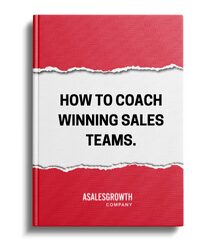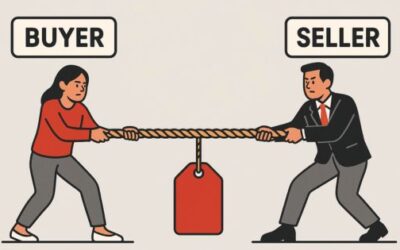So you want to build a winning sales team? Conventional wisdom probably leads you to believe that you need to go find the best salesperson in your industry and steal them from a competitor. But what if I told you that wasn’t the case. That spending money on a superstar isn’t going to make your team that much better if better at all?
There is a book called The Numbers Game; Why Everything You Know About Soccer is Wrong. It was written by Chris Anderson and David Sally. Think Moneyball for soccer. If you’re a soccer fan, you may have heard of it. If you’re Malcolm Gladwell fan and have been listening to his new podcast, it may ring a bell, because he references it in the My Hundred Million episode.
Weak Link, Strong Link Theory
The Numbers Game, like Moneyball for baseball, turns the conventional wisdom on what’s required to win in Soccer on its head. One of the surprising revelations of this book was the weak link, strong link theory.
The theory suggests that sports fall into one of two categories, weak link or strong link. Weak link suggests that a team is only as good as it’s weakest players. Strong link suggests, a team is only as good as it’s strongest players.
For example; Soccer is a weak link sport. Because there are so few opportunities to score, because there are 11 players on the field and the best players can only have the ball for so long, mistakes by the weakest players will have a disproportionate effect on the outcome of the game. Basketball, on the other hand, is a strong link sport. There are multiple opportunities to score, there are only 4 other players on the court and the best player can make up for any mistakes of the weakest players.
The power in these designations comes in how you manage the talent. If you’re the owner or GM of a Basketball team, the best thing you can do to win is to get the best player on your team. One great player can mean the difference between winning and losing. Therefore, betting all your resources in one superstar is a good bet.
In soccer, however, signing a Messi, or a Renaldo isn’t as important as minimizing the bottom talent. In soccer, you are far better off spending the money you’d give to a Messi on four above average, but not great players. Understanding whether or not you’re playing a weak link game or strong link game can have a tremendous impact on your desired outcomes.
How Does This Apply to Sales? How do I Build a Winning Sales Team?
These designations also play out in the workplace. And when it comes to sales, it’s important to know where it falls.
Sales is a weak link function. Hiring one or two powerhouse salespeople is not going to help you scale, it’s not going to help you win.
Every salesperson is responsible for his or her own quota. There is little teamwork or team effort with the other sales reps. Great salespeople can’t help underperforming salespeople sell more. They can’t save a deal when a weak sales person screws it up. The best thing your most impressive sales people can do is sell more. A great sales person can make up 10, 20, maybe 30 percent of a weak salespersons deficiency, but that’s about it. To build impressive winning sales teams, you need to focus on the bringing up the bottom performers over focusing on your top performers.
If you want to accelerate sales in your organization, start looking at the bottom performers. How many do you have? How good or bad are they? What percentage of the team do they make up? Can they be improved?
Can they be coached up?
Because sales is weak link, the biggest opportunity for success starts with focusing on your bottom performers and finding the opportunities to grow from the bottom up. Too often we focus on trying to find those rainmakers. Those scarce A-players that will fundamentally change our sales team. In sales, that’s the wrong way to look at it. The great opportunity in sales is at the bottom and if you can get to it, the results may surprise you.
Need more resources to help build a winning sales team? Check out our resources library here.





0 Comments